英语的十一种时态和例子
11种时态

十一种时态和例子(1)一般现在时、1) They go to work by bike every day.他们每天都骑自行车去工作。
2) Does the moon move around the sun? Yes, it does.月亮总是围绕着太阳转吗?是的,月亮总是围绕着太阳转3) He doesn't love sports.他不喜欢娱乐/运动4) We are all teachers from the country.我们所有是老师都是来自乡村的5) The children don’t have enough food in Africa.在非洲孩子是没有足够的食物的6) Do you go to see your uncle every other day?你是每隔一天就去看你的叔叔吗?(2)现在进行时1)They are showing us around the farm.他们2)Are the students reading now?3)It isn't raining hard.4)We are leaving on Friday.(3)现在完成时1)How many words have you learnt today?2)He hasn't got up yet.3)I have been to England.(4)现在完成进行时1)I've been sitting here all day.2)Has it been raining for three days? Yes, it has. 3)We have not just been talking about you. (5)一般过去时1)My mother wasn't in last night.2)We didn't watch TV last night.3)The girl cried just now.4)We were middle school students last year.5)Were you at home last night? Yes, I were.6)Did you wash clothes last night? No, I didn't. (6)过去进行时1)I was reading at night yesterday morning.2)We weren't planting trees this time yesterday.3)Were they singing when the teacher came? Yes, they were.(7)过去完成时1)He said he hadn't collected 300 stamps.2)Had you learnt 280 new words by the end of last month ?3)When I rushed to the cinema, the film had begun. (8)过去将来时1)He said his mother would buy a bike for him2)My brother told me he wouldn’t believe Jack any more.3)Would it be all right if he knew his illness?(9)一般将来时1)When will you be able to visit us again?2)I won't be free tonight.3)My sister will finish her middle school this year. (10)将来完成时1)We will have finished our middle school next July.2)Will he have finished writing the novel by the end of next month? Yes, he will.3)We won't have finished the job when you turn back.(11)将来进行时1)What will they be doing tomorrow evening?2)It won't be long before we will be making such a good train.3)I won't be leaving until 12.。
英语中的全部时态

提问者采纳一、一般现在时:1.概念:经常、反复发生的动作或行为及现在的某种状况。
2.时间状语:always, usually, often, sometimes, every week (day, year, month…), once a week, on Sundays,3.基本结构:动词原形(如主语为第三人称单数,动词上要改为第三人称单数形式)4.否定形式:am/is/are+not;此时态的谓语动词若为行为动词,则在其前加don't,如主语为第三人称单数,则用doesn't,同时还原行为动词。
5.一般疑问句:把be动词放于句首;用助动词do提问,如主语为第三人称单数,则用does,同时,还原行为动词。
6.例句:. It seldom snows here.He is always ready to help others.Action speaks louder than words.二、一般过去时:1.概念:过去某个时间里发生的动作或状态;过去习惯性、经常性的动作、行为。
2.时间状语:ago, yesterday, the day before yesterday, last week,last(year, night, month…), in 1989, just now, at the age of 5, one day, long long ago, once upon a time, etc.3.基本结构:be动词;行为动词的过去式4.否定形式:was/were+not;在行为动词前加didn't,同时还原行为动词。
5.一般疑问句:was或were放于句首;用助动词do的过去式did 提问,同时还原行为动词。
6.例句:She often came to help us in those days.I didn't know you were so busy.三、现在进行时:1.概念:表示现阶段或说话时正在进行的动作及行为。
英语语法(时态、语态)
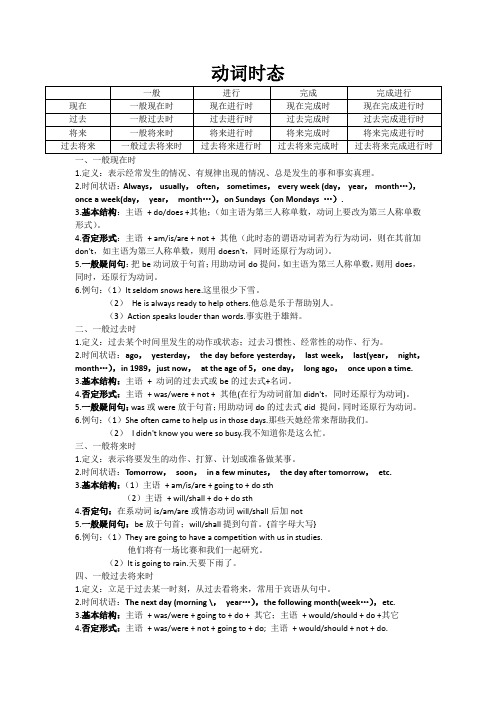
动词时态一、一般现在时1.定义:表示经常发生的情况、有规律出现的情况、总是发生的事和事实真理。
2.时间状语:Always,usually,often,sometimes,every week (day,year,month…),once a week(day,year,month…),on Sundays(on Mondays …).3.基本结构:主语+ do/does +其他;(如主语为第三人称单数,动词上要改为第三人称单数形式)。
4.否定形式:主语+ am/is/are + not + 其他(此时态的谓语动词若为行为动词,则在其前加don't,如主语为第三人称单数,则用doesn't,同时还原行为动词)。
5.一般疑问句:把be动词放于句首;用助动词do提问,如主语为第三人称单数,则用does,同时,还原行为动词。
6.例句:(1)It seldom snows here.这里很少下雪。
(2)He is always ready to help others.他总是乐于帮助别人。
(3)Action speaks louder than words.事实胜于雄辩。
二、一般过去时1.定义:过去某个时间里发生的动作或状态;过去习惯性、经常性的动作、行为。
2.时间状语:ago,yesterday,the day before yesterday,last week,last(year,night,month…),in 1989,just now,at the age of 5,one day,long ago,once upon a time.3.基本结构:主语+ 动词的过去式或be的过去式+名词。
4.否定形式:主语+ was/were + not + 其他(在行为动词前加didn't,同时还原行为动词)。
5.一般疑问句:was或were放于句首;用助动词do的过去式did 提问,同时还原行为动词。
初中英语时态总结表
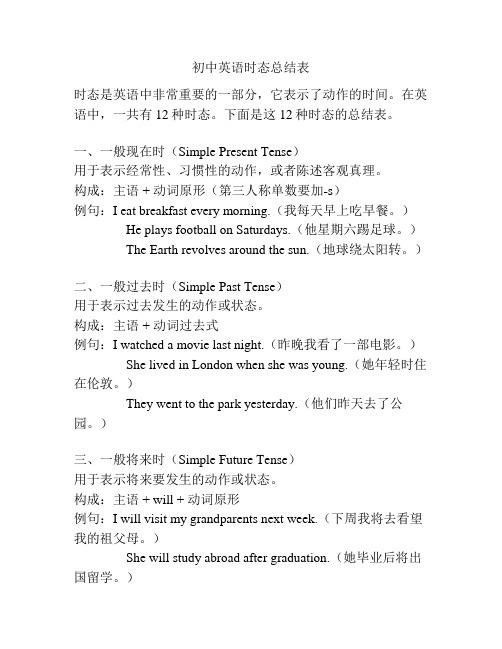
初中英语时态总结表时态是英语中非常重要的一部分,它表示了动作的时间。
在英语中,一共有12种时态。
下面是这12种时态的总结表。
一、一般现在时(Simple Present Tense)用于表示经常性、习惯性的动作,或者陈述客观真理。
构成:主语 + 动词原形(第三人称单数要加-s)例句:I eat breakfast every morning.(我每天早上吃早餐。
)He plays football on Saturdays.(他星期六踢足球。
)The Earth revolves around the sun.(地球绕太阳转。
)二、一般过去时(Simple Past Tense)用于表示过去发生的动作或状态。
构成:主语 + 动词过去式例句:I watched a movie last night.(昨晚我看了一部电影。
)She lived in London when she was young.(她年轻时住在伦敦。
)They went to the park yesterday.(他们昨天去了公园。
)三、一般将来时(Simple Future Tense)用于表示将来要发生的动作或状态。
构成:主语 + will + 动词原形例句:I will visit my grandparents next week.(下周我将去看望我的祖父母。
)She will study abroad after graduation.(她毕业后将出国留学。
)They will have a party on Friday.(他们将在星期五举行一个派对。
)四、现在进行时(Present Continuous Tense)用于表示现在正在进行的动作。
构成:主语 + am/is/are + 现在分词(-ing形式)例句:I am reading a book now.(我现在在读一本书。
)She is playing the piano at the moment.(她此刻正在弹钢琴。
英语的十一种时态与例句

英语的十一种时态与例子(1)一般现在时,1) They go to work by bike every day. ,2) Does the moon move around the sun? Yes, it does. ,3) He doesn't love sports. ,4) We are all teachers from the country. ,5) The children don’t have enough food in Africa. ,6) Do you go to see your uncle every other day? ,(2)现在进行时,1)They are showing us around the farm. ,2)Are the students reading now?,3)It isn't raining hard. ,4)We are leaving on Friday. ,(3)现在完成时,1)How many words have you learnt today? ,2)He hasn't got up yet. ,3)I have been to England. ,(4)现在完成进行时,1)I've been sitting here all day. ,2)Has it been raining for three days? Yes, it has. ,3)We have not just been talking about you. ,(5)一般过去时,1)My mother wasn't in last night. ,2)We didn't watch TV last night. ,3)The girl cried just now. ,4)We were middle school students last year. ,5)Were you at home last night? Yes, I were. ,6)Did you wash clothes last night? No, I didn't. ,(6)过去进行时,1)I was reading at night yesterday morning. ,2)We weren't planting trees this time yesterday. ,3)Were they singing when the teacher came? Yes, they were. ,(7)过去完成时,1)He said he hadn't collected 300 stamps. ,2)Had you learnt 280 new words by the end of last month ? ,3)When I rushed to the cinema, the film had begun. ,(8)过去将来时,1)He said his mother would buy a bike for him ,2)My brother told me he wouldn’t believe Jack any more. ,3)Would it be all right if he knew his illness? ,(9)一般将来时,1)When will you be able to visit us again? ,2)I won't be free tonight. ,3)My sister will finish her middle school this year. ,(10)将来完成时,1)We will have finished our middle school next July. ,2)Will he have finished writing the novel by the end of next month? Yes, he will. ,3)We won't have finished the job when you turn back. ,(11)将来进行时,1)What will they be doing tomorrow evening? ,2)It won't be long before we will be making such a good train. ,3)I won't be leaving until 12. 网络。
16种时态及语态总结
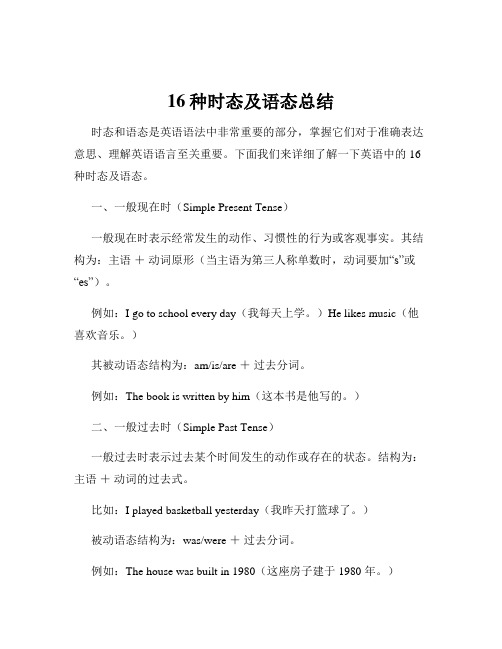
16种时态及语态总结时态和语态是英语语法中非常重要的部分,掌握它们对于准确表达意思、理解英语语言至关重要。
下面我们来详细了解一下英语中的 16 种时态及语态。
一、一般现在时(Simple Present Tense)一般现在时表示经常发生的动作、习惯性的行为或客观事实。
其结构为:主语+动词原形(当主语为第三人称单数时,动词要加“s”或“es”)。
例如:I go to school every day(我每天上学。
)He likes music(他喜欢音乐。
)其被动语态结构为:am/is/are +过去分词。
例如:The book is written by him(这本书是他写的。
)二、一般过去时(Simple Past Tense)一般过去时表示过去某个时间发生的动作或存在的状态。
结构为:主语+动词的过去式。
比如:I played basketball yesterday(我昨天打篮球了。
)被动语态结构为:was/were +过去分词。
例如:The house was built in 1980(这座房子建于 1980 年。
)三、一般将来时(Simple Future Tense)一般将来时表示将来要发生的动作或存在的状态。
结构有多种,常见的有:will +动词原形;be going to +动词原形。
例如:I will visit my grandparents next week(下周我将去看望我的祖父母。
)She is going to have a party(她打算举办一个聚会。
)其被动语态结构为:will be +过去分词;be going to be +过去分词。
比如:The meeting will be held tomorrow(会议将在明天举行。
)The show is going to be cancelled(这个演出将要被取消。
)四、现在进行时(Present Continuous Tense)现在进行时表示正在进行的动作。
高中英语语法系统复习—十一动词的时态.doc

高中英语语法系统复习—十一动词的时态11.1 一般现在时的用法1)经常性或习惯性的动作,常与表示频腮度的时间状语连用。
时间状语:every…, sometimes, at…, on Sunday。
例如:I leave home for school at 7 every morning. 每天早上我七点离开家。
2)客观真理,客观存在,科学事实。
例如:The earth moves around the sun. 地球绕太阳转动。
Shanghai lies in the east of China. 上海位于中国东部。
3)表示格言或警句。
例如:Pride goes before a fall.骄者必败。
注意:此用法如果出现在宾语从句中,即使主句是过去时,从句谓语也要用一般现在时。
例:Columbus proved that the earth is round. 哥伦布证实了地球是圆的。
4)现在时刻的状态、能力、性格、个性。
例如:I don\'t want so much. 我不要那么多。
Ann writes good English but does not speak well. 安英语写得不错,讲的可不行。
比较:Now I put the sugar in the cup. 把糖放入杯子。
I am doing my homework now. 我正在做功课。
第一句用一般现在时,用于操作演示或指导说明的示范性动作,表示言行的瞬间动作。
第二句中的now是进行时的标志,表示正在进行的动作的客观状况,所以后句用一般现在时。
11.2 一般过去时的用法1)在确定的过去时间里所发生的动作或存在的状态。
例如:时间状语有:yesterday, last week, an hour ago, the other day, in 1982等。
例如:Where did you go just now? 刚才你上哪儿去了?2)表示在过去一段时间内,经常性或习惯性的动作。
十六种英语时态的详细介绍及例句。
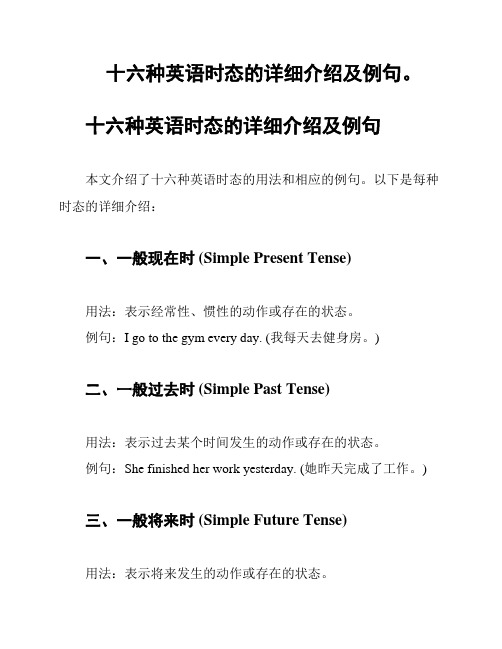
十六种英语时态的详细介绍及例句。
十六种英语时态的详细介绍及例句本文介绍了十六种英语时态的用法和相应的例句。
以下是每种时态的详细介绍:一、一般现在时 (Simple Present Tense)用法:表示经常性、惯性的动作或存在的状态。
例句:I go to the gym every day. (我每天去健身房。
)二、一般过去时 (Simple Past Tense)用法:表示过去某个时间发生的动作或存在的状态。
例句:She finished her work yesterday. (她昨天完成了工作。
)三、一般将来时 (Simple Future Tense)用法:表示将来发生的动作或存在的状态。
例句:I will meet them tomorrow. (我明天会见他们。
)四、现在进行时 (Present Continuous Tense)用法:表示现在正在进行的动作。
例句:They are playing football in the park. (他们正在公园里踢足球。
)五、过去进行时 (Past Continuous Tense)用法:表示过去某个时间正在进行的动作。
例句:She was studying when I called her. (当我给她打电话时,她正在研究。
)六、将来进行时 (Future Continuous Tense)用法:表示将来某个时间正在进行的动作。
例句:They will be sleeping when we arrive. (我们到达时,他们会正在睡觉。
)七、现在完成时 (Present Perfect Tense)用法:表示过去发生并与现在有连系的动作或状态。
例句:I have seen that movie before. (我以前看过那部电影。
)八、过去完成时 (Past Perfect Tense)用法:表示过去某个时间或动作之前完成的动作。
16种时态的例句
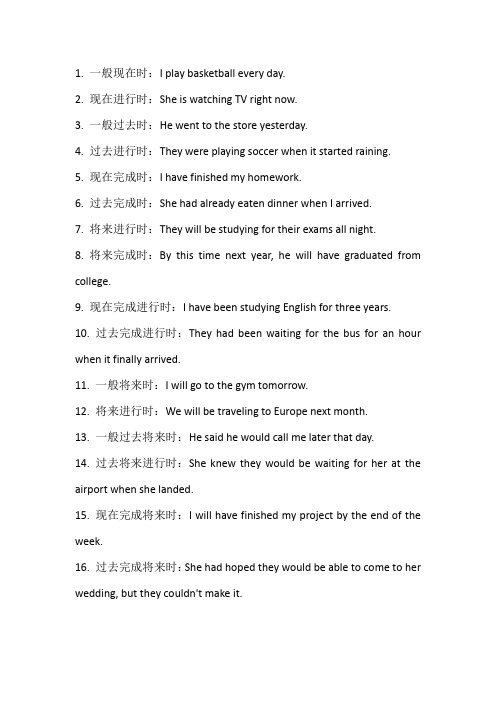
1. 一般现在时:I play basketball every day.2. 现在进行时:She is watching TV right now.3. 一般过去时:He went to the store yesterday.4. 过去进行时:They were playing soccer when it started raining.5. 现在完成时:I have finished my homework.6. 过去完成时:She had already eaten dinner when I arrived.7. 将来进行时:They will be studying for their exams all night.8. 将来完成时:By this time next year, he will have graduated from college.9. 现在完成进行时:I have been studying English for three years.10. 过去完成进行时:They had been waiting for the bus for an hour when it finally arrived.11. 一般将来时:I will go to the gym tomorrow.12. 将来进行时:We will be traveling to Europe next month.13. 一般过去将来时:He said he would call me later that day.14. 过去将来进行时:She knew they would be waiting for her at the airport when she landed.15. 现在完成将来时:I will have finished my project by the end of the week.16. 过去完成将来时:She had hoped they would be able to come to her wedding, but they couldn't make it.。
16种英语时态总结归纳

16种英语时态总结归纳英语中有16种时态,每种时态都有不同的用法和含义。
下面是对这些时态进行总结和归纳。
一、一般现在时 (Simple Present)1. 表示经常性、习惯性动作:I go to school every day.2. 表示客观事实或普遍真理:The sun rises in the east.3. 表示常态情况:He likes chocolate.二、现在进行时 (Present Continuous)1. 表示正在进行的动作:I am studying English.2. 表示暂时的情况或计划:She is staying at a hotel until she finds an apartment.三、一般过去时 (Simple Past)1. 表示过去发生的动作:I visited my grandparents last weekend.2. 表示过去的经历:She studied in France for two years.四、过去进行时 (Past Continuous)1. 表示过去某一时刻正在进行的动作:They were watching a movie when I called.2. 表示过去同时发生的两个动作:I was cooking dinner while he was cleaning the house.五、一般将来时 (Simple Future)1. 表示将要发生的动作:I will meet you at the park tomorrow.2. 表示决定或打算:We are going to have a party next weekend.六、将来进行时 (Future Continuous)1. 表示将来某一时刻正在进行的动作:They will be traveling to Europe this time next year.2. 表示持续性的动作:I will be working late tonight.七、现在完成时 (Present Perfect)1. 表示过去发生但与现在有关的动作:I have finished my homework.2. 表示经历或经验:He has traveled to many countries.八、过去完成时 (Past Perfect)1. 表示在过去某一时刻之前已经完成的动作:They had already left when I arrived.2. 表示顺序:She had read the book before watching the movie.九、将来完成时 (Future Perfect)1. 表示将来某一时刻之前完成的动作:I will have finished my project by tomorrow.2. 表示结果:They will have arrived by the time we get there.十、现在完成进行时 (Present Perfect Continuous)1. 表示从过去某一时刻开始一直持续到现在的动作:I have been studying for three hours.2. 表示强调动作的持续性:He has been working all day.十一、过去完成进行时 (Past Perfect Continuous)1. 表示过去某一时刻之前一直持续到过去的动作:She had been waiting for two hours when the bus finally arrived.2. 表示强调动作的持续性:They had been playing tennis all afternoon.十二、将来完成进行时 (Future Perfect Continuous)1. 表示将来某一时刻之前持续进行的动作:I will have been studying for five hours by the time the exam starts.2. 表示强调动作的持续性:They will have been working on the project for a month.十三、虚拟现在时 (Present Unreal)1. 表示与现在事实相反的假设:If I were rich, I would buy a mansion.2. 表示建议或要求:I suggest that he study more.十四、虚拟过去时 (Past Unreal)1. 表示与过去事实相反的假设:If I had studied harder, I would have passed the exam.2. 表示遗憾或后悔:I wish I had bought that dress.十五、虚拟将来时 (Future Unreal)1. 表示与将来事实相反的假设:If I won the lottery, I would travel the world.2. 表示不可能实现的愿望:I wish she would become a famous singer.十六、过去将来时 (Future in the Past)1. 表示过去某一时刻之后将要发生的动作:He said he would call me later.2. 表示过去的计划:I thought we were going to have dinner together.以上是对16种英语时态的总结归纳。
十六种时态知识点总结
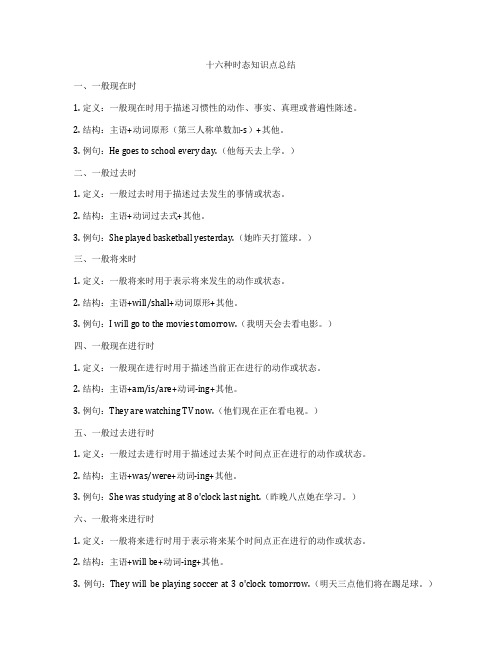
十六种时态知识点总结一、一般现在时1. 定义:一般现在时用于描述习惯性的动作、事实、真理或普遍性陈述。
2. 结构:主语+动词原形(第三人称单数加-s)+其他。
3. 例句:He goes to school every day.(他每天去上学。
)二、一般过去时1. 定义:一般过去时用于描述过去发生的事情或状态。
2. 结构:主语+动词过去式+其他。
3. 例句:She played basketball yesterday.(她昨天打篮球。
)三、一般将来时1. 定义:一般将来时用于表示将来发生的动作或状态。
2. 结构:主语+will/shall+动词原形+其他。
3. 例句:I will go to the movies tomorrow.(我明天会去看电影。
)四、一般现在进行时1. 定义:一般现在进行时用于描述当前正在进行的动作或状态。
2. 结构:主语+am/is/are+动词-ing+其他。
3. 例句:They are watching TV now.(他们现在正在看电视。
)五、一般过去进行时1. 定义:一般过去进行时用于描述过去某个时间点正在进行的动作或状态。
2. 结构:主语+was/were+动词-ing+其他。
3. 例句:She was studying at 8 o'clock last night.(昨晚八点她在学习。
)六、一般将来进行时1. 定义:一般将来进行时用于表示将来某个时间点正在进行的动作或状态。
2. 结构:主语+will be+动词-ing+其他。
3. 例句:They will be playing soccer at 3 o'clock tomorrow.(明天三点他们将在踢足球。
)七、一般现在完成时1. 定义:一般现在完成时用于描述过去发生的动作对当前的影响或结果。
2. 结构:主语+have/has+动词过去分词+其他。
3. 例句:She has finished her homework.(她已经完成了她的作业。
英语十六种时态的记忆技巧

英语十六种时态的记忆技巧一、简单现在时(Simple Present):- 使用频率:经常、一直、总是。
- 表达:表示现在的事实、经常发生的动作以及长期的状态。
- 示范:I always go to the gym on Mondays.二、现在进行时(Present Continuous):- 使用频率:现在正在进行的动作。
- 表达:表示目前正在进行的动作。
- 示范:She is studying for her exam right now.三、简单过去时(Simple Past):- 使用频率:过去发生的事情或状态。
- 表达:表示过去某个时间发生的动作或事实。
- 示范:They went on vacation last summer.四、过去进行时(Past Continuous):- 使用频率:过去某个时间段正在进行的动作。
- 表达:表示过去某个时间段内正在进行的动作。
- 示范:He was watching TV when I called him.五、简单将来时(Simple Future):- 使用频率:将来要发生的事情。
- 表达:表示将来某个时间要发生的动作或事件。
- 示范:We will have a meeting tomorrow.六、将来进行时(Future Continuous):- 使用频率:将来某个时间段正在进行的动作。
- 表达:表示将来某个时间段内正在进行的动作。
- 示范:They will be playing football at 8 pm tomorrow.七、过去将来时(Past Future):- 使用频率:过去某个时间点已经发生的将来动作。
- 表达:表示过去某个时间点预计要发生的动作。
- 示范:She told me that she would call me later.八、过去完成时(Past Perfect):- 使用频率:过去某个时间点之前已经完成的动作。
英语十六种时态使用规则总结

英语十六种时态使用规则总结一、一般现在时1. 表示现在的常态或普遍真理。
2. 表示经常发生的动作或惯。
3. 表示客观事实或现实情况。
4. 表达感觉、看法、喜好等心理状态。
二、一般过去时1. 表示过去的事实、状态或惯。
2. 表示过去经常发生的动作。
3. 表达过去的心理状态、看法。
例:He played basketball yesterday.(他昨天打了篮球。
)三、一般将来时1. 表示将来时间内发生的事情,包括计划、安排、意图等。
2. 使用“be going to”或将来时态的助动词“shall/will”。
例:They are going to travel to Europe next month.(他们下个月打算去欧洲旅行。
)四、现在进行时1. 表示现在某一时刻正在进行的动作。
2. 使用动词的现在分词形式(-ing结尾)和助动词“be”。
例:I am studying English at the moment.(我此刻正在研究英语。
)五、过去进行时1. 表示过去某一时刻正在进行的动作。
2. 使用动词的过去分词形式(-ing结尾)和过去时态的助动词“be”。
例:She was cooking dinner at 6 p.m. yesterday.(昨天下午6点她在做晚餐。
)六、将来进行时1. 表示将来某一时刻正在进行的动作。
2. 使用将来时态的助动词“will be”和动词的现在分词形式(-ing 结尾)。
例:They will be studying for the exam tomorrow afternoon.(他们明天下午将在研究考试。
)七、现在完成时1. 表示过去发生的事情对现在造成的影响或结果。
2. 使用助动词“have/has”和动词的过去分词形式。
例:I have finished reading the book.(我已经读完这本书。
)八、过去完成时1. 表示过去某一时间或动作之前已经完成的动作。
(word完整版)英语十一种主要时态总结,.docx

英语十一种主要时态总结1、一般在:概念:常、反复生的作或行及在的某种状况。
状: always, usually, often, sometimes, every week (day, year, month⋯), oncea week, etc.基本构:① be ;②行否定形式:① am/is/are+not;②此的若行,在其前加don't,如主第三人称数,用doesn't,同原行。
一般疑句:①把 be 放于句首;②用助do 提,如主第三人称数,用 does,同,原行。
一般在由原形表示,但第三人称数后要加尾-s,be 和 have 要根据人称的化使用特殊的形式。
一般在主要表示常性的作或存在的状,可用来表示普遍真理。
The Yangtze rises in Qinghai. 江源于青海。
Actions speak louder than words. 行于言辞。
We have friends all over the world. 我的朋友遍天下。
2、一般去:概念:去某个里生的作或状;去性、常性的作、行。
状: ago, yesterday, the day before yesterday, last week(year, night, month ⋯), in 1989, just now, at the age of 5, one day, long long ago, once upon a time, etc.基本构:① be ;②行否定形式:① was/were+ not;②在行前加didn't,同原行。
一般疑句:① was 或 were 放于句首;②用助 do 的去式 did 提,同原行。
一般去由去式表示, be 根据人称有 was 和 were 两个形,在尾加 -d-或 ed;其他参不化表 , 主要表示去某生的作或情况。
It ’ s a pity that you did not go to the movie很.憾你没有去看那部影。
高中三年16种英语时态

高中三年16种英语时态英语是全球通用的语言,掌握好英语的时态对于阅读、听力、口语及写作都有很大的帮助,同时也是考试中必不可少的一项内容。
高中学习中共有16种英语时态,本文将对这16种时态简要介绍,希望能帮助读者更深入理解其用法和语法规则。
一、一般现在时一般现在时表示一个习惯性的动作或者一个行动状态。
主语+ 动词原形(+ 其他)例如:I read a book every day.(我每天都会阅读一本书。
)二、一般过去时一般过去时表示过去某个时间发生的动作,或描述过去某段时间的状态。
主语+ 动词过去式(+ 其他)例如:I played soccer yesterday.(昨天我踢了一场足球。
)三、一般将来时一般将来时表示一个将要发生的动作或事件。
主语+ will + 动词原形(+ 其他)例如:I will go to China next month.(我下个月要去中国。
)四、现在进行时现在进行时表示正在进行的动作或者状态,也可以表示未来的计划。
主语+ am/is/are + 现在分词(+ 其他)例如:He is watching TV right now.(他正在看电视。
)五、过去进行时过去进行时表示过去某个时间正在进行的动作或状态,并且该动作是发生在过去某一时刻的。
主语+ was/were + 现在分词(+ 其他)例如:I was studying in the library at six p.m. yesterday.(昨天下午6点我正在图书馆学习。
)六、将来进行时将来进行时表示某个将来某个时间正在进行的动作或状态。
主语+ will be + 现在分词(+ 其他)例如:We will be having dinner at six p.m. tomorrow.(明天晚上六点我们正在吃饭。
)七、过去完成时过去完成时表示过去的某个时间之前已经完成的动作。
主语+ had + 过去分词(+ 其他)例如:We had finished our homework when our parents came back.(我们父母回来时我们已经完成了家庭作业。
英语中的16种时态(全)

英语中的16种时态(全)2.时间状语:tomorrow。
next week(year。
month…),soon。
in the future。
etc.3.基本结构:主语+will+动词原形4.否定形式:主语+will+not+动词原形5.一般疑问句:将will放于句首;用助动词do提问,同时还原行为动词。
6.例句:I XXX.我下周会去看望我的祖父母。
Will you come to the party with me tonight?今晚你会和我一起去参加聚会吗?四、现在进行时1.概念:表示现在正在进行的动作。
2.时间状语:now。
at present。
at the moment。
etc.3.基本结构:主语+am/is/are+动词的现在分词(-ing)4.否定形式:主语+am/is/are+not+动词的现在分词(-ing)5.一般疑问句:将be动词放于句首;用助动词do提问,同时还原行为动词。
6.例句:I am studying English right now.我正在研究英语。
XXX me?你在听我说话吗?五、过去进行时1.概念:表示过去某一时刻正在进行的动作。
2.时间状语:at that time。
at 8 o'clock yesterday evening。
etc.3.基本结构:主语+was/were+动词的现在分词(-ing)4.否定形式:主语+was/were+not+动词的现在分词(-ing)5.一般疑问句:将be动词放于句首;用助动词do的过去式did提问,同时还原行为动词。
6.例句:She was cooking XXX when I arrived home.我到家时她正在做晚饭。
Were you sleeping when I called you last night?昨晚我给你打电话时你在睡觉吗?六、将来进行时1.概念:表示将来某一时刻正在进行的动作。
2.时间状语:at this time next year。
【整理】英语16种时态表

【整理】英语16种时态表一、一般现在时一般现在时表示经常发生或习惯性的动作、状态或真理。
其结构为:主语 + 动词原形(第三人称单数加s/es)。
例句:He goes to school bike every day.(他每天骑自行车上学。
)二、一般过去时一般过去时表示过去某个时间发生的动作或存在的状态。
其结构为:主语 + 动词过去式。
例句:I visited the Great Wall last year.(去年我参观了长城。
)三、一般将来时一般将来时表示将来某个时间会发生的动作或存在的状态。
其结构为:will + 动词原形。
例句:She will graduate from college next year.(她明年将大学毕业。
)四、现在进行时现在进行时表示正在进行的动作或状态。
其结构为:主语 + be动词(am/is/are) + 现在分词。
例句:They are watching a movie in the cinema.(他们正在电影院看电影。
)五、过去进行时过去进行时表示在过去某个时间正在进行的动作或状态。
其结构为:主语 + was/were + 现在分词。
例句:She was reading a book when I called her.(我给她打电话时,她正在看书。
)六、将来进行时将来进行时表示将来某个时间正在进行的动作或状态。
其结构为:will be + 现在分词。
例句:In two hours, we will be sitting in the classroom.(两小时后,我们将坐在教室里。
)七、现在完成时现在完成时表示过去发生的动作对现在造成的影响或结果,常与时间状语since, for, already, yet等连用。
其结构为:主语 +have/has + 过去分词。
例句:She has already finished her homework.(她已经完成了她的家庭作业。
英语十六种时态总结

英语十六种时态总结一、一般现在时(Simple Present Tense)一般现在时表示的是经常性或习惯性的动作、事实或状况。
它的基本结构是主语 + 动词原形(第三人称单数加s)。
例如: - I eat breakfast every day. - He plays football on weekends.二、一般过去时(Simple Past Tense)一般过去时指发生在过去某个时间的动作、事实或状况。
它的基本结构是主语+ 动词过去式。
例如: - She studied at Harvard University. - They went to the beach last summer.三、一般将来时(Simple Future Tense)一般将来时表示将来发生的动作、事实或状况。
它的基本结构是主语 + will + 动词原形。
例如: - I will visit my grandparents next month. - They will have a party on Saturday.四、现在进行时(Present Continuous Tense)现在进行时表示目前正在进行的动作或状况。
它的基本结构是主语 +am/is/are + 动词-ing。
例如: - She is studying for an exam. - They are playing basketball in the park.五、过去进行时(Past Continuous Tense)过去进行时表示在过去某个时间正在进行的动作或状况。
它的基本结构是主语+ was/were + 动词-ing。
例如: - This time last year, I was working in London. - They were watching a movie when I called.六、将来进行时(Future Continuous Tense)将来进行时表示将来某个时间正在进行的动作或状况。
高中英语十一种时态及被动

高中英语十一种时态及被动高中英语通常涵盖了十一种主要时态以及被动语态。
以下是这些时态及被动的简要介绍:1. 一般现在时(Simple Present Tense):用于描述经常性、习惯性或普遍真理。
例如:I play tennis every Sunday.2. 一般过去时(Simple Past Tense):用于描述过去发生的动作或状态。
例如:She danced at the party last night.3. 一般将来时(Simple Future Tense):用于表示将来发生的动作或计划。
例如:We will go to the beach next weekend.4. 现在进行时(Present Continuous Tense):用于描述正在进行的动作。
例如:They are studying for the exam.5. 过去进行时(Past Continuous Tense):用于描述过去某一时刻正在进行的动作。
例如:He was reading a book when I entered the room.6. 将来进行时(Future Continuous Tense):用于描述将来某一时刻正在进行的动作。
例如:At this time tomorrow, they will be having dinner.7. 现在完成时(Present Perfect Tense):用于描述过去发生的动作对现在的影响或与现在有关的经历。
例如:I have visited Paris.8. 过去完成时(Past Perfect Tense):用于描述过去某一时间点之前已经发生的动作。
例如:She had already left when I arrived.9. 将来完成时(Future Perfect Tense):用于描述将来某一时间点之前将会完成的动作。
例如:By next year, he will havegraduated.10. 现在完成进行时(Present Perfect Continuous Tense):用于描述从过去某一时刻开始,一直持续到现在的动作。
- 1、下载文档前请自行甄别文档内容的完整性,平台不提供额外的编辑、内容补充、找答案等附加服务。
- 2、"仅部分预览"的文档,不可在线预览部分如存在完整性等问题,可反馈申请退款(可完整预览的文档不适用该条件!)。
- 3、如文档侵犯您的权益,请联系客服反馈,我们会尽快为您处理(人工客服工作时间:9:00-18:30)。
英语的十一种时态和例子
(1)一般现在时
1) They go to work by bike every day.
2) Does the moon move around the sun? Yes, it does.
3) He doesn’t love sports.
4) We are all teachers from the country.
5) The children don’t have enough food in Africa.
6) Do you go to see your uncle every other day?
(2)现在进行时
1)They are showing us around the farm.
2)Are the students reading now?
3)It isn’t raining hard.
4)We are leaving on Friday.
(3)现在完成时
1)How many words have you learnt today?
2)He hasn’t got up yet.
3)I have been to England.
(4)现在完成进行时
1)I’ve been sitting here all day.
2)Has it been raining for three days? Yes, it has.
3)We have not just been talking about you.
(5)一般过去时
1)My mother wasn’t in l ast night.
2)We didn’t watch TV last night.
3)The girl cried just now.
4)We were middle school students last year.
5)Were you at home last night? Yes, I were.
6)Did you wash clothes last night? No, I didn’t.
(6)过去进行时
1)I was reading at night yesterday morning.
2)We weren’t planting trees this time yesterday.
3)Were they singing when the teacher came? Yes, they were.
(7)过去完成时
1)He said he hadn’t collected 300 stamps.
2)Had you learnt 280 new words by the end of last month ?
3)When I rushed to the cinema, the film had begun.
(8)过去将来时
1)He said his mother would buy a bike for him 2)My brother told me he wouldn’t believe Jack any more.
3)Would it be all right if he knew his illness?
(9)一般将来时
1)When will you be able to visit us again?
2)I won’t be free tonight.
3)My sister will finish her middle school this year.
(10)将来完成时
1)We will have finished our middle school next July.
2)Will he have finished writing the novel by the end of next month? Yes, he will.
3)We won’t have finished the job when you turn back.
(11)将来进行时
1)What will they be doing tomorrow evening?
2)It won’t be long before we will be making such a good train.
3)I won’t be leaving until 12.。
